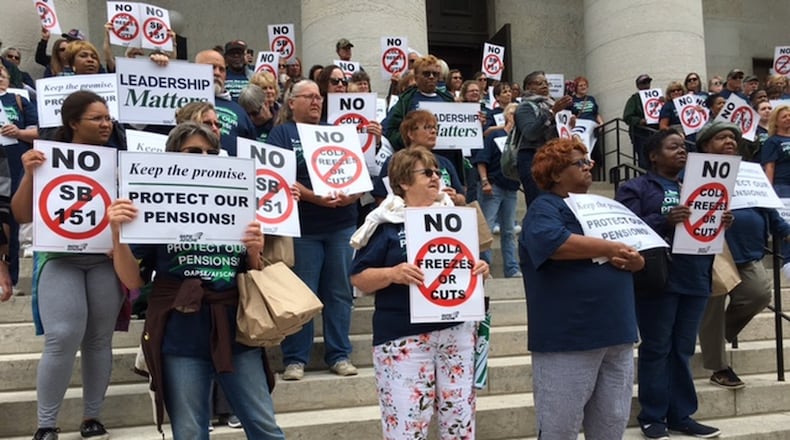It alleges that SERS squandered its solid financial position it held in 2000 with a series of poor decisions over several years, including spending $852.4 million on outside investment fund management fees between 2007 and 2017.
"The monies spent by SERS for outside investment consultants is at best a disgrace and its worst evidences inept public policy choices, if not outright criminal conduct, by SERS, its management, and actuary," the complaint says. Joining the lawsuit is the Ohio Association of Public School Employees.
Related: School employees protest planned cuts at Statehouse
SERS said in a statement: “For nearly two years, SERS held several open meetings with representatives from all advocacy groups, including OAPSE, to discuss possible benefit changes and their effects on SERS and its membership. We modeled the effects of numerous combinations of changes before deciding on the COLA changes that were implemented. We are disappointed that OAPSE’s opposition to these changes was not registered during the open process when they could have been addressed with input from all interested parties.”
Unlike Ohio’s larger public pension funds, the smaller systems rely more heavily on outside consultants to help manage investments and assets. SERS hires outside managers to oversee its $14.7 billion in assets.
All five systems suffered steep losses during the 2008 financial crisis that led to the Great Recession. Those losses, along with spiraling health care expenses and people living longer, led the systems to trim benefits in recent years.
In October 2017, the SERS board of trustees voted to freeze the cost of living allowances given to retirees for three years as a means of shoring up its financial position. SERS retirees on average receive a monthly pension check of $1,223 and the COLA would have given them an additional $30.58 each month. Retirees are eligible for COLA bumps after they’ve been retired for four years.
The lawsuit challenges whether SERS trustees had the authority to mandate the freeze, which was scheduled to take effect Jan. 1, 2018.
Membership of SERS includes 158,000 bus drivers, cafeteria workers, janitors and other school employees and 79,000 retirees.
Ohio has five public pension funds representing nearly 1.9-million government workers, retirees and beneficiaries.
Last year, the State Teachers Retirement System of Ohio voted in April to eliminate cost of living allowances indefinitely and the Ohio Police & Fire Pension Fund began restructuring the health care benefits for retirees beginning in January 2019. Ohio Public Employees Retirement System — the largest of the five — is considering COLA cuts.
Lawmakers implemented sweeping pension reform in 2012, forcing workers and retirees to shoulder a heavier burden in keeping the systems solvent.
Ohio’s five public pension systems are defined benefit plans, meaning participants are guaranteed certain pension benefits based on age, years of service and final average pay. The benefits are prescribed by law and each system — not union contracts. Each fund is responsible for its liabilities — not Ohio taxpayers. Funding comes from worker and employer contributions as well as investment returns.
About the Author

